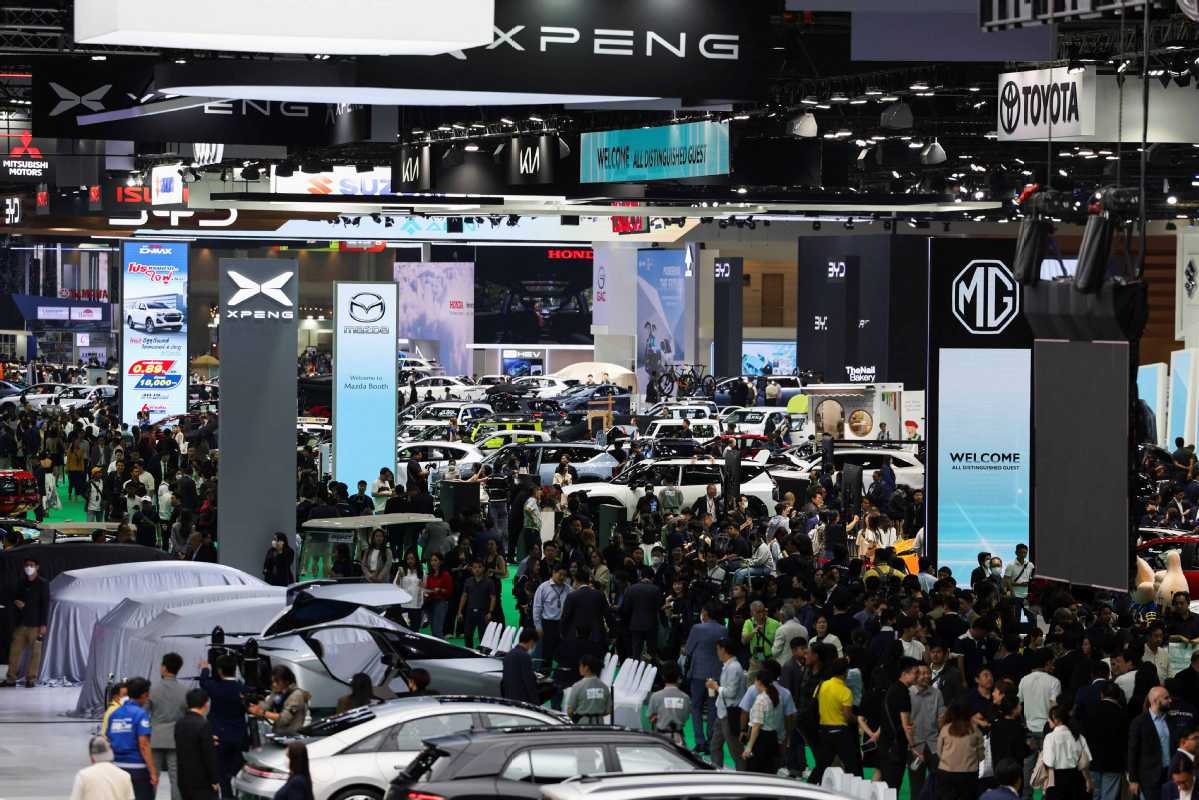
Crowds throng the floor of the 45th Bangkok International Motor Show in Thailand on March 25. [Photo/Agencies]
Chinese automakers have taken the spotlight at the Bangkok International Motor Show with the unveiling of a series of new energy models that aim to capture more market share as Thailand accelerates its electrification efforts.
The show, one of Southeast Asia's most influential auto exhibitions, was once dominated by Japanese brands. They occupied nearly half of the booths just over two years ago. Running from March 25 to April 7 this year, Chinese brands have taken the center stage.
China's largest new energy vehicle maker, BYD, is displaying its lineup including the Dolphin compact, the mid-sized Seal fastback and the Atto 3 electric crossover, which is the best-seller in the Thai market.
In 2023, BYD sold 30,650 EVs in Thailand, followed by 12,777 sold by Neta, a brand of Chinese electric vehicle maker Hozon Auto.
Neta launched the V-II SUV at the event. It has begun production in Neta's Thailand factory, which is the first overseas production line for the company.
Chinese SUV and pickup maker Great Wall Motor is showcasing popular models from its marques including Poer, Haval, Tank and Ora. Among them, the Sahar, the first and only hybrid pickup in the Thai market, has begun pre-sales at the motor show.
GWM, one of the first Chinese automakers to enter Thailand, is operating its first overseas NEV production base in the country, which features complete vehicle manufacturing capabilities and a quality test system. It is the only automobile factory in Thailand capable of producing battery, plug-in hybrid and hybrid EVs.
GWM is also developing Thailand's NEV infrastructure, setting up a comprehensive charging network covering more than 85 percent of the country's public charging stations through its app and partnerships with five operators.
Geely's premium brand, Zeekr, is showcasing the X SUV, 009 MPV and 007 sedan at the show. Among them, a right-hand drive Zeekr X was premiered.
The automaker announced that right-hand drive models of the 009 and 007 have commenced pre-sales and will be delivered to Thai customers in the third quarter.
Zeekr will open 10 showrooms in Thailand this year, said Mars Chen, vice-president of Emerging Markets at Zeekr.
Chen stated the company's aspiration to position itself within the premium segment, citing favorable market conditions for new entrants. "In the premium segment, there's a lot of room for a new player like us," Chen said.
Chinese EV startup Xpeng is another carmaker targeting the premium segment of the Thai market. The newcomer to Southeast Asia is showcasing its X9 MPV, P7 sedan and G6 and G9 SUVs as well as a flying car at its booth.
Xpeng announced the establishment of a long-term strategic partnership with the Thai dealership group Neo Mobility Asia at the motor event.
The company plans to open five showrooms in Thailand this year to offer high-end EVs, according to Elsa Zhang, senior manager for its overseas business.
State-owned automaker Changan Automobile launched its new city car, the Lumin, along with extended-range versions of the Deepal S07 SUV and L07 sedan, enriching mobility options for Thai consumers.
The automaker will start producing NEVs at a Thai facility in early 2025, with an annual capacity of 200,000 vehicles. By 2030, it will have 15 NEVs in the Thai market.
Besides, BYD, Chery Automobile and GAC Aion announced plans in 2023 to set up factories in Thailand to produce NEVs.
In all, Chinese automakers have committed to invest more than $1.44 billion in production facilities in Thailand, Reuters reported.
Surapong Paisitpattanapong, the Federation of Thai Industries' automotive industry spokesperson, said that local EV production capacity is expected to reach 100,000 cars by the end of 2024 as new facilities, mainly from Chinese carmakers, come online.
The Thai government plans for BEVs to account for 30 percent of total car manufacturing by 2030.
The country's EV sales in 2023 only accounted for 9 percent of the total. The figure is expected to double by the end of 2024.
Krisda Utamote, president of the Electric Vehicle Association of Thailand, said that in recent years, Chinese NEV brands in Thailand have seen improvements in brand recognition and quality acceptance, driven by attractive pricing and expanding after-sales service systems, which have bolstered consumer confidence.
As Southeast Asia's largest auto manufacturing hub, Thailand is the preferred first destination for Chinese automakers venturing into the region. Meanwhile, the production of right-hand drive versions in Thailand assists their entry into global markets, industry experts said.
In 2023, the registration of new BEVs in Thailand exceeded 76,000 vehicles, a significant increase from 9,678 vehicles in 2022. Among them, Chinese brands accounted for an 80 percent market share in the NEV market.
Eight Chinese automakers were listed in the top 10 of BEV sales in Thailand in 2023, with the top three spots being Chinese brands.